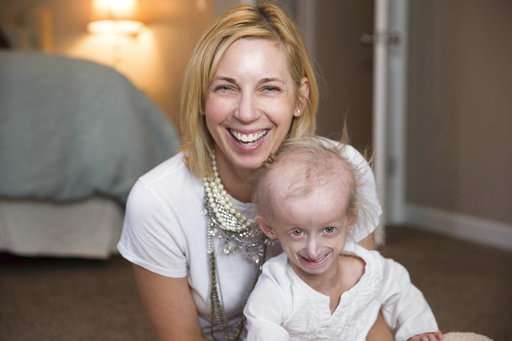
Progeria, also known as Hutchinson-Gilford progeria syndrome (HGPS), is a rare genetic condition that causes a child’s body to age fast. Most kids with progeria do not live past age 13. The disease affects both sexes and all races equally. It affects about 1 in every 4 million births worldwide.
Children with progeria generally appear normal at birth. During the first year, signs and symptoms, such as slow growth and hair loss, begin to appear.
Heart problems or strokes are the eventual cause of death in most children with progeria. The average life expectancy for a child with progeria is about 13 years. Some with the disease may die younger and others may live longer, even up to 20 years.
Symptoms
Usually within the first year of life, growth of a child with progeria slows markedly, but motor development and intelligence remain normal.
Signs and symptoms of this progressive disorder include a distinctive appearance;
- Slowed growth, with below-average height and weight
- Narrowed face, small lower jaw, thin lips and beaked nose
- Head disproportionately large for the face
- Prominent eyes and incomplete closure of the eyelids
- Hair loss, including eyelashes and eyebrows
- Thinning, spotty, wrinkled skin
- Visible veins
- High-pitched voice
Signs and symptoms also include health issues;
- Severe progressive heart and blood vessel (cardiovascular) disease
- Hardening and tightening of skin on the trunk and extremities (similar to scleroderma)
- Delayed and abnormal tooth formation
- Some hearing loss
- Loss of fat under the skin and loss of muscle mass
- Skeletal abnormalities and fragile bones
- Stiff joints
- Hip dislocation
- Insulin resistance
Diagnosis Progeria
Since the symptoms are very noticeable, it’s likely that the child’s pediatrician will spot them during a routine check-up.
If there are changes in the child that seem like symptoms of progeria, make an appointment with a doctor. The doctor will do a physical exam, test hearing and vision, measure pulse and blood pressure, and compare the child’s height and weight to other kids the same age.
Afterwards, if the pediatrician is concerned, the child will need to see a specialist in medical genetics, who can confirm the diagnosis with a blood test.
Treatments
At this time, there’s no cure for progeria, but researchers are working on finding one. A kind of cancer drug, FTI’s (farnesyltransferase inhibitors), may fix the damaged cells.
Treatments usually help ease or delay some of the disease’s symptoms.
Medication – patients may be prescribed drugs to lower cholesterol or prevent blood clots. A low dose of aspirin everyday can help prevent heart attacks and stroke. Growth hormone can help build height and weight.
Physical and Occupational Therapy – it can help with the patients moving if they have stiff joints or hip problems.
Surgery – some children may have coronary bypass surgery or angioplasty to slow the progression of heart disease.
What We Offer
We at Almurshidi Medical Tourism will find the best doctors to cater to your needs. We are partnered with a wide network of hospitals and clinics that provide top quality medical experience.
We provide free medical estimates, make medical appointments, and provide several medical opinions if needed at no cost.
Contact Us
For more information contact us at +66822004040 or via WhatsApp





